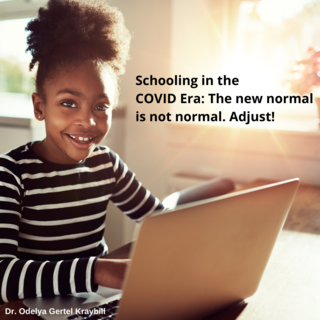Stress
COVID Era Schooling: A Letter to School Administrators
The new normal is not normal. Adjust!
Posted September 30, 2020

It has been about a month since kids returned to school. For most, that means online schooling, at least for the first semester. We — children, teachers, and parents — are in for at least several more months of Zoom Fatigue and daily struggles with feeling inadequate.
As a therapist and mother of school-age children, I ponder daily how my family and the people I work with cope with this strangest of times. Schools, for the most part, seem to be trying to stick with the old curriculum of traditional learning objectives. But it’s hard for anyone to feel successful doing that in Zoom.
Crises are rich opportunities for learning if we recognize them as such. We miss the opportunities if we try to pretend we can keep doing what we did before. Now is a time to revisit a fundamental question: What is the core purpose of education?
I suggest it is quite simple: To give children the tools they need to be prepared for life. Our concern now should be: How can we manage schooling in this crisis in a way that maximizes opportunities for children to learn how to deal with stress and adversity in a time of crisis?
We are in the midst of the most pervasive global catastrophe in living memory, with no end in sight. This catastrophe challenges us at every level of being and it does so in ways that children today will encounter over and over again throughout their lives. Dynamics similar to those that make this pandemic so bad are going to be present for all of their days. These include high human mobility, inconsistent access to healthcare, environmental deterioration, technologies of mass destruction, and the ability of leaders to convey false information on a mass scale.
Some of those will worsen in the future, not improve. So it is hard to avoid the conclusion that frequent, large scale disruption of life will be a part of “normal” human experience from now on.
We are missing a crucial learning opportunity if we continue to do schooling in the same old way during this pandemic. We need to shift our focus from “How soon can we get back to the way it was?” to “How can we maximize the opportunity presented by this difficult time for us to help children learn skills that are essential for the rest of their lives?"
The New Normal Is Not Normal
Every one of us is affected directly or indirectly by the global pandemic. We are worried about our health, financial survival, our relationships, and our emotional wellbeing. Together, these add up to a heavy burden of uncertainty. In this context, we should seek:
1. Less focus on academics and more on self-regulation and self-efficacy. It’s nearly impossible for children of any age to sit 5-7 hours in front of a computer every day and focus, learn and retain traditional academic information. Suggestions:
- Reduce the academic curriculum to basics and add frequent intervals of activities that help kids connect to one another, at least several times a day.
- Revisit homework expectations, in conversation with parents and students, and be open to reductions in homework, since the existing ones assume a learning environment that is not present.
- Allow flexibility in the school day so kids won’t need to sit in front of the computer five-plus hours. Reducing screen time will benefit children and reduce individual and family stress.
- Begin every class with different kinds of checking in. For example, ask the kids to pick an object in the room, or go around the house and find an object that reflects how they feel. Let them each talk about it, write a poem, draw, or share in small groups something about this object. By helping children frequently talk about what they are experiencing, teachers can help the kids normalize their experience.
2. Teach children how to deal with adversity. Key aspects to include:
- Psychoeducation. Provide information about stress and how it impacts our lives. This will help kids understand and normalize their difficulties in facing the complexity of COVID. They need help in naming COVID as the source of the pervasive sense of distress they are living in; without this assistance, many children come to believe that the bad feelings they have are their fault. (See here and here).
While there are many variables that impact the way we face adversity, we all cope (react and respond) differently. These reactions are survival mechanisms triggered by the high levels of stress that surround us. They are a normal response to an abnormal situation. Introduce important definitions that are beneficial for kids to identify their own existing resilience and help them develop a sense of post-traumatic growth. (Read more.)
- Self-Regulation. This is the ability to manage extreme (positive or negative) emotions, sensations, and thoughts (more here), and it is perhaps the single most important ability for managing stress. Self-regulation means different things at different times.
- Sometimes we need to calm ourselves (when we are hyper and everything seems too intense). In such times we can color, draw, dance following a calming pace, stretch, or use age-appropriate mindful activity/meditation.
- Sometimes we need energizers. Chronic stress may push us into withdrawal that blocks us from engaging with things that can give us life. Physical movement helps address this - it activates both sides of the body which in turn facilitates bi-lateral integration of both sides of the brain. This helps the nervous system calm down and enables kids to ground, focus, and retain information.
Both forms of activities described above are movement-based. Everyone benefits from movement — adults and children. But for working with children, a repertoire of simple movement exercises is essential. Stress has such an impact on our bodies because it operates through the autonomic nervous systems that affect all of the body. These systems are highly responsive to physical movement since they facilitate sensory integration and strengthen vagus tone.
- Action. The ability to choose a response to a situation helps us maintain a sense of self-control. This stands in contrast to the usual way of reacting to stress, which is instinctive and automatic. When we get to a point where we can choose our responses to situations we are better equipped to dealing with current and future adversity. Engaging in self-regulation activities — physical education, music, arts — helps strengthen a sense of self-control and facilitates self-regulation, especially if kids get to choose the activity (from a list of possible activities). (Read more.)
- Social Engagement. This is one of the core mediators of stress management when facing adversity. Play is a powerful antidote to stress, but when we are stressed, our ability to play is diminished. (This is especially true for adults, but also for kids.) Quarantine makes the problem even worse. For these reasons, play is one of the most rewarding ways to increase self-regulation and experience a renewed sense of joy. With kids, this means:
- Encourage play. There’s a variety of ways this can be done, even online. I don’t mean Xbox-type games but rather playing charades, guessing games, roleplay and simulation games, etc. When kids need to calm down they can play online cards, checkers, or chess.
- Encourage and assist kids to have a small group that they have a frequent check-in with, send postcards, have lunch-bunch calls together, plan a watch-party, etc. Teachers can give a list of suggestions that the kids choose from every week or an alphabet list of ideas that helps maintain social engagement while on social distancing.
- Help children improve their sense of self-efficacy, meaning, and purpose. A sense of self-efficacy — “I can do it," “I am good at X," “I have capabilities such as X" — is a powerful buffer against the long-lasting impact of stress and trauma. But the pandemic erodes self-efficacy by imposing distance and a sense of isolation. Kids may have difficulty concentrating or performing as they used to prior to COVID. We can help kids maintain or develop self-efficacy with these strategies:
- Ask kids to read and write about other people who faced adversity, what helped them, and how and how they can use their own strategies and skills to face current challenges.
- Give kids concrete plans for an assignment and help them identify the challenges and resources that helped them complete the assignment.
- Teach and model that maintaining routines and sustaining practices is key for both self-efficacy and stress management. Encourage kids to maintain a daily/weekly routine.
We are all coping right now. It is important to help students focus on how they are managing difficulties at this time. It does not have to be perfect management. The emphasis should be on the fact that we are trying and persisting. With time, coping gets better and a sense of self-efficacy improves.
- Help kids develop a sense of meaning and purpose. After basic survival skills (shelter, food, sleep) we need spiritual food to move from survival to development and growth. A sense of purpose is facilitated with commitment, meaningful engagement, goal-oriented acts, and a vision larger than oneself. Ways to build these:
- Ask kids to engage in altruistic acts as a part of their school assignments, depending on their age. For example, shop for a neighbor, cook/bake, clean the garden of a neighbor, write care cards or postcards for the elderly or people in need, participate in cleanup activities, and so forth.
- Have kids write gratitude statements on a regular basis. These could be in the form of journaling, poems, drawings, or any other art form (photography, sculpturing, drama, etc.).
- Use storytelling. Help kids develop a personal narrative on different topics and learn how to narrate it, orally or in writing, to others.
- Teach the practice of self-compassion. Self-compassion is the ability to consciously respond to our actions without judgment, focusing instead on our common humanity, self-kindness, and mindfulness (read more). It enables us to normalize ourselves and our responses to experiences. It also helps us to expand our capacity to endure pain, learn to live with uncertainty (read more), and eventually find meaning in difficult experiences.
In the U.S., over 200,000 have now lost their lives from COVID and 7.1 million people have tested positive. It seems there will be many more. We know so little about what lies ahead. Let us use this time to teach our kids how to deal with adversity.


